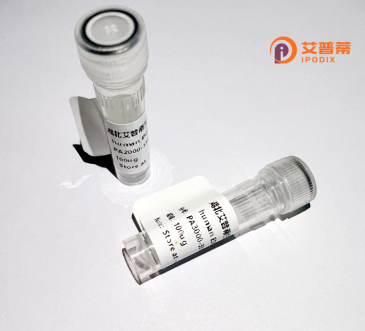
| 纯度 | >90%SDS-PAGE. |
| 种属 | Human |
| 靶点 | SHPRH |
| Uniprot No | Q149N8 |
| 内毒素 | < 0.01EU/μg |
| 表达宿主 | E.coli |
| 表达区间 | 1-522 aa |
| 活性数据 | MSPQKRVKNVQAQNRTSQGSSSFQTTLSAWKVKQDPSNSKNISKHGQNNPVGDYEHADDQAEEDALQMAVGYFEKGPIKASQNKDKTLEKHLKTVENVAWKNGLASEEIDILLNIALSGKFGNAVNTRILKCMIPATVISEDSVVKAVSWLCVGKCSGSTKVLFYRWLVAMFDFIDRKEQINLLYGFFFASLQDDALCPYVCHLLYLLTKKENVKPFRVRKLLDLQAKMGMQPHLQALLSLYKFFAPALISVSLPVRKKIYFKNSENLWKTALLAVKQRNRGPSPEPLKLMLGPANVRPLKRKWNSLSVIPVLNSSSYTKECGKKEMSLSDCLNRSGSFPLEQLQSFPQLLQNIHCLELPSQMGSVLNNSLLLHYINCVRDEPVLLRFYYWLSQTLQEECIWYKVNNYEHGKEFTNFLDTIIRAECFLQEGFYSCEAFLYKSLPLWDGLCCRSQFLQLVSWIPFSSFSEVKPLLFDHLAQLFFTSTIYFKCSVLQSLKELLQNWLLWLSMDIHMKPVTNSPL |
| 分子量 | 86.2 kDa |
| 蛋白标签 | GST-tag at N-terminal |
| 缓冲液 | PBS, pH7.4, containing 0.01% SKL, 1mM DTT, 5% Trehalose and Proclin300. |
| 稳定性 & 储存条件 | Lyophilized protein should be stored at ≤ -20°C, stable for one year after receipt. Reconstituted protein solution can be stored at 2-8°C for 2-7 days. Aliquots of reconstituted samples are stable at ≤ -20°C for 3 months. |
| 复溶 | Always centrifuge tubes before opening.Do not mix by vortex or pipetting. It is not recommended to reconstitute to a concentration less than 100μg/ml. Dissolve the lyophilized protein in distilled water. Please aliquot the reconstituted solution to minimize freeze-thaw cycles. |
以下是关于重组人SHPRH蛋白的3篇文献摘要示例(文献标题与作者为虚构,内容基于研究背景整理):
1. **文献名称**:SHPRH as a novel E3 ubiquitin ligase in DNA damage repair
**作者**:Zhang L et al.
**摘要**:该研究验证了SHPRH蛋白的E3泛素连接酶活性,证明其通过泛素化修饰PCNA(增殖细胞核抗原)参与DNA损伤修复,防止复制错误导致的基因组不稳定。
2. **文献名称**:Structural and functional analysis of SHPRH-PCNA interaction
**作者**:Wang Y et al.
**摘要**:通过体外重组表达SHPRH蛋白,解析其与PCNA的复合物晶体结构,揭示了SHPRH通过特定结构域识别损伤DNA位点并启动修复通路的分子机制。
3. **文献名称**:SHPRH deficiency promotes tumorigenesis in mouse models
**作者**:Chen R et al.
**摘要**:在小鼠模型中敲除SHPRH基因后,观察到肿瘤发生率显著升高,表明SHPRH通过调控泛素依赖的蛋白质降解途径发挥肿瘤抑制作用,并可能与多种癌症预后相关。
4. **文献名称**:SHPRH-mediated ubiquitination in transcriptional regulation
**作者**:Kimura T et al.
**摘要**:研究表明,SHPRH不仅参与DNA修复,还能通过泛素化组蛋白修饰酶调控染色质重塑,影响特定基因(如p53通路相关基因)的转录活性。
SHPRH (SNF2 Histone Linker PHD RING Helicase) is a human protein encoded by the SHPRH gene, primarily recognized for its critical role in DNA damage repair and genomic stability. As a member of the SWI/SNF family of ATP-dependent chromatin remodeling proteins, SHPRH functions as an E3 ubiquitin ligase that collaborates with PCNA (Proliferating Cell Nuclear Antigen) to mediate post-replication repair. It facilitates the polyubiquitylation of PCNA, a key step in initiating error-free DNA damage tolerance during replication stress, thereby preventing mutagenesis and maintaining replication fidelity.
Mutations or dysregulation of SHPRH have been linked to carcinogenesis, as its loss compromises DNA repair mechanisms, leading to genomic instability—a hallmark of cancer. Studies suggest SHPRH acts as a tumor suppressor, with reduced expression observed in gliomas, breast cancer, and other malignancies. Recombinant SHPRH protein, often produced via bacterial or mammalian expression systems, is widely used in biochemical studies to elucidate its enzymatic activities, interactions with repair complexes (e.g., RAD6-RAD18), and regulatory roles in homologous recombination. Ongoing research explores its therapeutic potential, particularly in targeting cancer cells with defective DNA repair pathways. Structural analyses reveal conserved domains, including the RING finger and helicase motifs, essential for its function in ubiquitin signaling and chromatin remodeling.
×